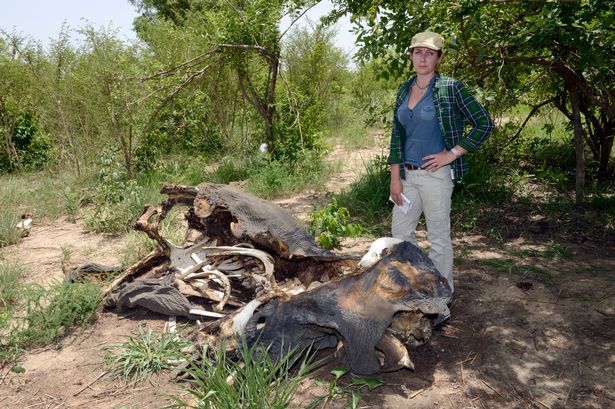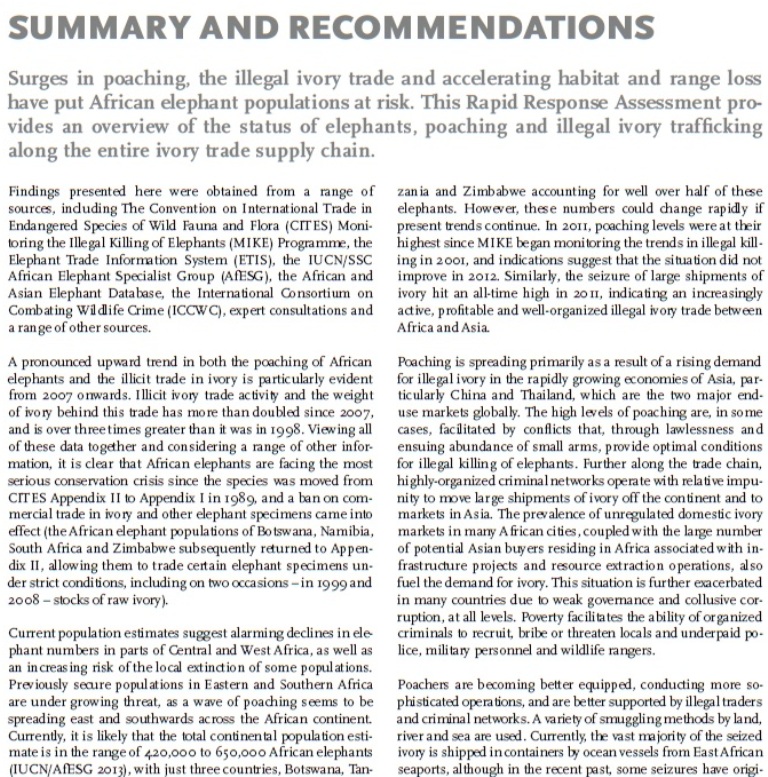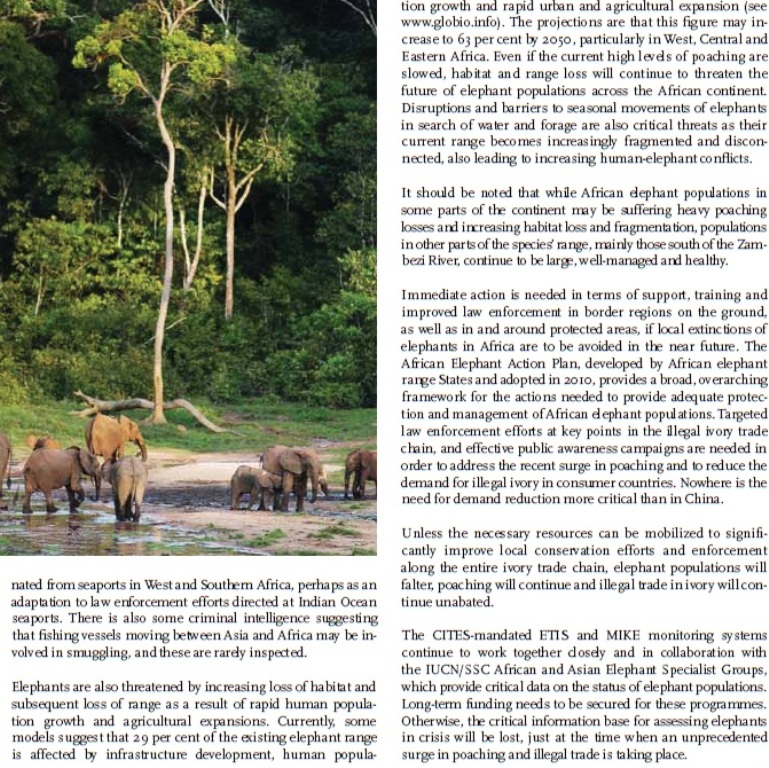Born Free: "The elephant poachers kill rangers then mutilate their bodies
On patrol with the tusk force stopping Africa's cruel ivory hunters
By Susie Boniface 24 Jun 2013 00:00

Lying in the bush after suffering a sickening death, this mutilated elephant shows the depths of cruelty ivory poachers will sink to in a bid to make a fast buck.
But the brave patrols who dedicate their time trying to stop the barbaric killings are no match for the heavily armed gangs hunting to satisfy a growing lust for the “white gold” in China, where tusks sell for £1,200-a-kilo.
One, headed by Daouda Ouedrago, has to rely on three ancient rifles and two AK47s - one of which has been deactivated – for protection. Their transport is three bicycles for transport and one of those has no saddle.
Each member of the patrol has a pair of handcuffs, a water canteen, and a map. They go into the bush for 48 hours at a time, tracking poachers who will shoot on sight if caught.
The youngest is just 17 - and they are all putting their lives on the line. If they are shot, or bitten by a snake, they will almost certainly die before they can get to the nearest hospital.
Daouda, 45, says: “We search for poachers but we cannot hope to fight them. We are there more as a deterrent. But there is a lot of money involved, and sometimes when they kill rangers they will mutilate the bodies afterwards as a message to others.”
The Mirror joined Daouda’s patrol in Burkina Faso to witness first hand the carnage caused by the poachers and the courage of those trying to stop them. His unit, one of three, consists of seven men including two volunteers.
Elephants here are unlike those anywhere else in Africa.
In Botswana, South Africa or Kenya, safari trucks can drive right up to grazing herds of several dozen mothers and babies and not cause a stir.
They are in protected reserves and feel safe in the presence of tourists.
In Burkina, they run. It is the only way to survive. Elephants are shot, poisoned and maimed by poachers who use chainsaws to carve off the still living animals’ faces to get at the ivory.
The illegal trade has brought west Africa’s elephant population to the brink of extinction. Burkina is thought to be home to around 5,000 of the creatures, but there hasn’t been a proper census for a decade.
A new smuggling route, and massive demand from the fresh wealth of China, has seen 106 killed in the past year alone.
During two days in the heart of Park W, a sprawling area of uninhabited bush the size of Yorkshire on the border with Benin and Niger, we saw just one still alive.
The lone bull was grazing amid thick cover when our guide spotted the outline of his spine. But as we grew close the wind changed direction, and at the first whiff of man he turned tail and fled.
The same was true of every animal we saw – baboons, warthogs, antelope, even birds were terrified of us.
Shelley Waterland of the Born Free Foundation says: “Ivory poachers don’t just kill elephants. They poach hippos and warthogs for smaller tusks, slaughter buffalo for food, and lions and cheetah for their skins. They set fires to stop anyone following them, and the flames burn for weeks. They’re heavily armed and they terrorise local communities.”
The Mirror travelled to Burkina Faso to work with Born Free. It is overseeing a drive to cut poaching using cash donated by readers of our sister paper the Sunday Mirror during a campaign to free Anne, Britain’s last circus elephant, who was abused by her handlers.
Readers donated more than £23,000 during a long campaign to free Anne. She was finally rescued and rehomed at Longleat Safari Park last year.
Now that money can be used to protect other elephants in the wild. Abga Bourema, who runs an eco-lodge in the park and is our guide, says: “Two or three years ago there were many elephants here. But then the poachers came.
“Now there are very few and those that remain are very scared. The elephants run away when they see you, they’re more likely to attack if cornered.
“Elephants are the gardeners of the bush. Their dung fertilises it, encourages growth, brings in small animals and the larger ones that follow. Without them, it is empty. There is no bush.
“Perhaps if we can stop the poaching, the animals will return. Then we can have tourists and that will pay for more anti-poaching patrols and help the communities here.”
The poachers responsible for this terror are a combination of desperate men from neighbouring countries and local villages.
The average wage is less than £1.60 a day, whereas even a small tusk weighing only four kilos is worth £10,000 to customers in China. Demand there has rocketed since 2007 when officials allowed the sale of an ivory stockpile.
The poachers – known as braconniers in this French speaking country – operate in groups of between two and six people, armed with powerful weapons, living rough in the bush for days at a time as they track the few elephants left.
After killing an animal and digging deep into its skull for the tusks they sell them on to a local trader for perhaps £250 or £300. A new smuggling route has opened up in nearby Togo, using container ships with lax security checks.
The middle men include gun runners, drug gangs, and Islamic fundamentalists as well as corrupt customs officials, who each take a cut and increase the final price. Although we did not see many elephants, there was plenty of signs of poaching.
We found carcasses, bonfires, forest fires and at one point were shot at as a warning to stay away.
In his bid to try to deter the poachers, Daouda sees his wife, Rose-Marie, and their two young sons just once every two months.
He says she is worried he will be killed protecting the elephants. The ranger adds: “I tell her I have been well-trained and not to worry. I chose to come here from a much safer office job because I believe it is important to look after the wildlife. This is a vocation for all of us. Without the right equipment it is very dangerous for the team, but we all make sacrifices to do this job.”
He says the elephants are killed by foreigners and by locals, but villagers are too terrified to name those responsible. Daouda adds: “With the money you have given us my patrol will be much safer.
“We can do a better job and educate people about why we need to stop the poaching. My wife will be a little happier too.”
The village of Kabougou sits on the edge of the park, and its residents farm crops right up to the edge of the protected area.
There is a history of conflict with the elephants according to farmer Oumpounini Ouoba. The 35 year-old says: “There were many here a few years ago. Sometimes they would come and destroy our crops, a year of work gone in one night.
The soil here is very hard and dry, it takes a lot of effort to make things grow. It makes people angry.”
So it is easy to see how villagers might decide to kill a problem elephant and raise a little cash at the same time, although Oumpounini insists he knows nothing about poaching.
He admits though that if they hear of an elephant who has been shot they harvest the carcass for the meat, fat, and intestines in the belief eating it will make them strong.
But Oumpounini also wants the elephant population to be protected. He says: “The ranger patrols are a good thing because they provide jobs for the community.
“If poaching stops there will be tourists and more activities in the park, which will be good for us. In the past we didn’t understand the benefits of a good environment, but the team here are teaching us that if the elephants are happy in the park, they will not come and eat our crops.
“We want to live happily with the elephants if we can.”
Valentin Tiendega, of the Ministry of the Environment, adds: “It is very difficult to persuade people to help the elephants and provide money for anti-poaching patrols.
“We hope that with the money you have donated we will get results which will not only protect those animals that remain, but will boost morale and make the government see more money would be an investment.
“If we lost the elephants here we would have lost them all over this part of Africa. It would be a great tragedy, and we are glad the readers of the Mirror think it is as important as we do.”






